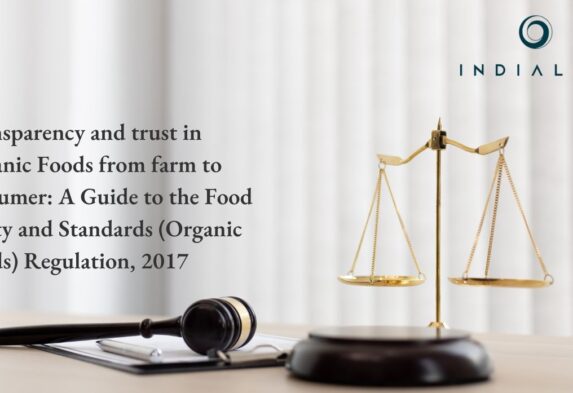Transparency and trust in Organic Foods from farm to consumer: A Guide to the Food Safety and Standards (Organic Foods) Regulation, 2017


The growing demand for organic food in India has highlighted the need for clear regulations to ensure that products marketed as organic meet specific safety and quality standards. Responding to this demand, the Food Safety and Standards Authority of India (FSSAI) introduced the Food Safety and Standards (Organic Foods) Regulation, 2017. This regulation is designed to establish a robust framework for the production, certification, labelling, and sale of organic food, ensuring that consumers receive genuine organic products that meet nationally and internationally recognized standards. The regulation aims to bolster consumer trust, enhance traceability, and promote ethical and sustainable practices within the organic food sector.
Table of Contents
Key Components of the Organic Foods Regulation
The Food Safety and Standards (Organic Foods) Regulation, 2017 contains several crucial elements, each contributing to the credibility and consistency of India’s organic food market.
1. Scope and Applicability
This regulation mandates that all parties involved in producing, packaging, selling, or importing organic food in India must adhere to specific standards. Compliance is required with one of two recognized systems: the National Programme for Organic Production (NPOP) or the Participatory Guarantee System for India (PGS-India). NPOP, aligned with international standards, is primarily used by producers who wish to access both domestic and global markets. On the other hand, PGS-India provides a community-oriented certification framework more accessible to small-scale farmers, allowing them to certify their organic practices without incurring high certification costs. Notably, small producers or producer organisations which sell directly to consumers are exempt from these certification systems, provided they maintain transparency in their organic claims and are so exempt by the FSSAI.
2. Labelling Requirements
One of the regulation’s primary goals is to ensure transparency and accuracy in organic food labelling. Under the regulation, labels on organic products must explicitly state the product’s organic status and meet the requirements of one of the approved certification systems. Certified products may display the FSSAI organic logo, signalling compliance with Indian organic standards. This labelling system ensures that consumers have accurate information on the organic status of their purchases, supporting informed decision-making.
3. Traceability and Integrity
Traceability is a critical aspect of the regulation, designed to maintain the organic integrity of products from production to sale. Under the regulation, all organic food must be traceable to the producer level, including details on production and handling practices. This traceability requirement helps protect the integrity of organic products throughout the supply chain and allows regulators to verify compliance. Additionally, intermediaries and aggregators who source organic food from small producers for direct consumer sales are required to keep traceability records to prevent fraud and ensure transparency.
4. Packaging and Display Standards
The regulation sets strict guidelines for packaging and display to distinguish organic products from non-organic options. Organic foods must meet FSSAI’s general packaging and labelling standards to safeguard consumer health and facilitate product identification. In retail settings, organic products must be displayed separately from conventional items, allowing consumers to quickly identify and choose organic options. This segregation also minimizes the risk of accidental contamination between organic and non-organic products during handling and storage.
Application of the System
The regulation enforces a tiered certification structure that provides flexibility while maintaining the rigor of organic standards. Under the National Programme for Organic Production (NPOP) and the Participatory Guarantee System for India (PGS-India), organic products are certified through either third-party agencies or community-driven verification models. NPOP certification, backed by third-party assessments, is more stringent and aligns with international standards, making it ideal for products targeting export as well as local markets. Conversely, PGS-India leverages community participation and local knowledge, which is beneficial for small-scale producers who may find the costs and requirements of third-party certification prohibitive. Aggregators and intermediaries collecting organic food from these small producers for direct sales to consumers are obligated to maintain traceability but are exempt from full certification requirements. This structure supports broader participation in organic certification across different scales of production, encouraging sustainable practices throughout India’s agricultural sector.
Additional Compliance and Import Standards
Beyond certification and labelling, the regulation requires organic foods to adhere to safety standards related to contaminants, additives, and residues. For instance, the regulation mandates stricter limits on pesticide residues than those applied to conventional foods, with a maximum limit set at 5% of the standard or at the level of quantification (LoQ), whichever is higher. This stricter requirement aligns with the expectation of “clean” food associated with organic products. In terms of imports, organic foods entering India under recognized bilateral or multilateral agreements do not require re-certification, provided they meet Indian food safety laws. These imports must be accompanied by a transaction certificate from an accredited certification body of equivalence, ensuring traceability and compliance with established standards.
Conclusion
The Food Safety and Standards (Organic Foods) Regulation, 2017, represents a pivotal step toward strengthening India’s organic food sector. By establishing a comprehensive framework for certification, labelling, traceability, and compliance, this regulation promotes both domestic and international confidence in Indian organic products. The regulation’s dual certification system—offering both NPOP and PGS-India certification options—provides flexibility for producers of all scales, from large exporters to small, local farmers. This inclusivity supports sustainable agricultural practices and encourages more farmers to adopt organic farming. As India’s organic market continues to expand, the regulation’s robust standards will be instrumental in maintaining the quality and integrity of organic foods, ultimately benefiting both consumers and producers. Through these efforts, India is poised to strengthen its position as a leader in the global organic food industry, providing safe, certified organic products that meet the growing consumer demand for healthful and environmentally conscious choices.




